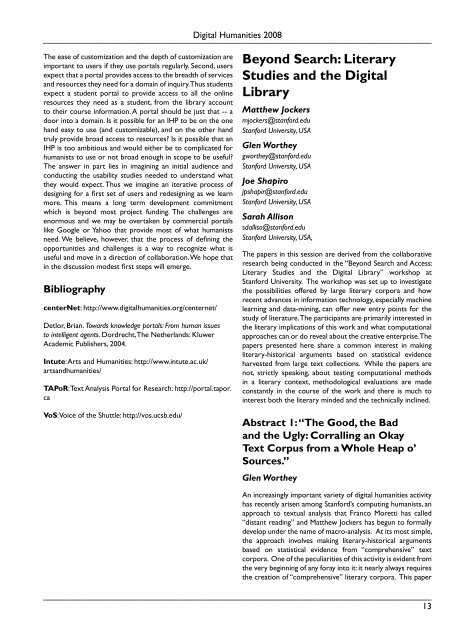Book of Abstracts - phase 14 - elektroninen.indd - Oulu
Book of Abstracts - phase 14 - elektroninen.indd - Oulu
Book of Abstracts - phase 14 - elektroninen.indd - Oulu
You also want an ePaper? Increase the reach of your titles
YUMPU automatically turns print PDFs into web optimized ePapers that Google loves.
Digital Humanities 2008<br />
_____________________________________________________________________________<br />
The ease <strong>of</strong> customization and the depth <strong>of</strong> customization are<br />
important to users if they use portals regularly. Second, users<br />
expect that a portal provides access to the breadth <strong>of</strong> services<br />
and resources they need for a domain <strong>of</strong> inquiry. Thus students<br />
expect a student portal to provide access to all the online<br />
resources they need as a student, from the library account<br />
to their course information. A portal should be just that -- a<br />
door into a domain. Is it possible for an IHP to be on the one<br />
hand easy to use (and customizable), and on the other hand<br />
truly provide broad access to resources? Is it possible that an<br />
IHP is too ambitious and would either be to complicated for<br />
humanists to use or not broad enough in scope to be useful?<br />
The answer in part lies in imagining an initial audience and<br />
conducting the usability studies needed to understand what<br />
they would expect. Thus we imagine an iterative process <strong>of</strong><br />
designing for a fi rst set <strong>of</strong> users and redesigning as we learn<br />
more. This means a long term development commitment<br />
which is beyond most project funding. The challenges are<br />
enormous and we may be overtaken by commercial portals<br />
like Google or Yahoo that provide most <strong>of</strong> what humanists<br />
need. We believe, however, that the process <strong>of</strong> defi ning the<br />
opportunities and challenges is a way to recognize what is<br />
useful and move in a direction <strong>of</strong> collaboration. We hope that<br />
in the discussion modest fi rst steps will emerge.<br />
Bibliography<br />
centerNet: http://www.digitalhumanities.org/centernet/<br />
Detlor, Brian. Towards knowledge portals: From human issues<br />
to intelligent agents. Dordrecht, The Netherlands: Kluwer<br />
Academic Publishers, 2004.<br />
Intute: Arts and Humanities: http://www.intute.ac.uk/<br />
artsandhumanities/<br />
TAPoR: Text Analysis Portal for Research: http://portal.tapor.<br />
ca<br />
VoS: Voice <strong>of</strong> the Shuttle: http://vos.ucsb.edu/<br />
Beyond Search: Literary<br />
Studies and the Digital<br />
Library<br />
Matthew Jockers<br />
mjockers@stanford.edu<br />
Stanford University, USA<br />
Glen Worthey<br />
gworthey@stanford.edu<br />
Stanford University, USA<br />
Joe Shapiro<br />
jpshapir@stanford.edu<br />
Stanford University, USA<br />
Sarah Allison<br />
sdalliso@stanford.edu<br />
Stanford University, USA,<br />
The papers in this session are derived from the collaborative<br />
research being conducted in the “Beyond Search and Access:<br />
Literary Studies and the Digital Library” workshop at<br />
Stanford University. The workshop was set up to investigate<br />
the possibilities <strong>of</strong>fered by large literary corpora and how<br />
recent advances in information technology, especially machine<br />
learning and data-mining, can <strong>of</strong>fer new entry points for the<br />
study <strong>of</strong> literature. The participants are primarily interested in<br />
the literary implications <strong>of</strong> this work and what computational<br />
approaches can or do reveal about the creative enterprise. The<br />
papers presented here share a common interest in making<br />
literary-historical arguments based on statistical evidence<br />
harvested from large text collections. While the papers are<br />
not, strictly speaking, about testing computational methods<br />
in a literary context, methodological evaluations are made<br />
constantly in the course <strong>of</strong> the work and there is much to<br />
interest both the literary minded and the technically inclined.<br />
Abstract 1: “The Good, the Bad<br />
and the Ugly: Corralling an Okay<br />
Text Corpus from a Whole Heap o’<br />
Sources.”<br />
Glen Worthey<br />
An increasingly important variety <strong>of</strong> digital humanities activity<br />
has recently arisen among Stanford’s computing humanists, an<br />
approach to textual analysis that Franco Moretti has called<br />
“distant reading” and Matthew Jockers has begun to formally<br />
develop under the name <strong>of</strong> macro-analysis. At its most simple,<br />
the approach involves making literary-historical arguments<br />
based on statistical evidence from “comprehensive” text<br />
corpora. One <strong>of</strong> the peculiarities <strong>of</strong> this activity is evident from<br />
the very beginning <strong>of</strong> any foray into it: it nearly always requires<br />
the creation <strong>of</strong> “comprehensive” literary corpora. This paper<br />
_____________________________________________________________________________<br />
13


